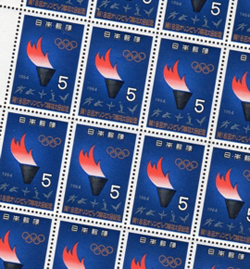
This exhibition at the Embassy of Japan takes a glimpse of Tokyo in 1964, the city that hosted the Games of the XVIII Olympiad, the first to be held in Asia. It looks at the some of the iconic architectural, graphic and technological designs of the time alongside a collection of Olympic memorabilia from the Prince Chichibu Memorial Sports Museum in Tokyo.
There is also the opportunity to see personal photographic records and loans from people who were there: the British athlete who took part; the young Japanese woman who worked in the Olympic Athletes’ Village; the tourist to Tokyo; the Olympic sports spectator; the interpreter for the BBC; the Olympic Attaché posted to the British Embassy in Tokyo.
They were the ‘TV Olympics’. It was the year that the Games were first broadcast in colour for television using a satellite relay system and which made significant the performances of the competing athletes for a world audience.
The coordinated graphic design work by Kamekura Yusaku (1915-1997) accompanied the Games and included the much-admired, bold, modernist Tokyo Olympic symbol, the first use of photography in Olympic poster art and the first use of pictograms to signify the Olympic sports.
It was the year of the inauguration of Japan’s high-speed so-called ‘Bullet Train’ and a new elevated automobile expressway system throughout the centre of Tokyo. The Olympic Games in 1964 in Tokyo proved to be an important milestone for the global profile of the Games, made possible with marked advances in Japanese media technology, and also how the world was to henceforth see Japan.
The exhibition is open to the public from 18 July until 7 September, Monday to Friday, 9.30 am to 5.30 pm. Admission is free, but photo ID is necessary to gain entry to the Embassy.
This exhibition has been made possible with kind cooperation and generosity of:
The British Museum, Sir Menzies Campbell QC MP, Mr Ken Clark, Mrs Wiesia Cook-Bownas, Mr Richard Ellingworth and his family, Dr Anton Gajdoš, JR Central, the Japan Society, Kyodo News, Dr Brian Powell, Prince Chichibu Memorial Sports Museum, Dr Nicole Coolidge Rousmaniere, Mrs Hideko Sharp, Mrs Louise Ward



